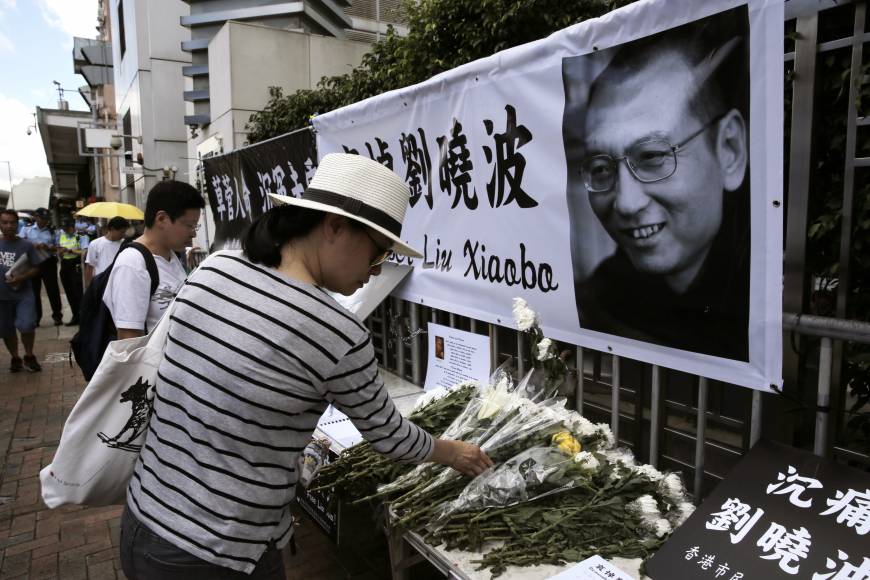BY MIZUHO AOKI

Those in Japan who knew Chinese Nobel Peace laureate Liu Xiaobo expressed shock Friday at news of his death, saying he was a noble man who dedicated his life to pursuing liberal democratic reform.
“I wanted him to live a little longer — at least until the end of his prison term,” said journalist Seiichiro Aso, who has penned many books on democratic movements in China.
“It’s really regrettable.”
Recalling the times he met Liu in person in 2006 and 2008, Aso said the lifelong activist was a noble yet friendly and open person.
“He talked frankly with people. He was a talkative man. At the same time he had dignity,” he said. “He wanted the Japanese government to support pro-democratic movements and human rights issues in China; he wanted the government to show more interest.”
Liu died in a Chinese hospital Thursday after being diagnosed with late-stage liver cancer.
He was sentenced to 11 years in 2009 after being convicted of “inciting subversion of state power,” and was awarded the Nobel Peace Prize in absentia in 2010 for championing human rights in China.
“I believe that by getting arrested, he had hoped that pro-democratic movements in China would progress,” he said.
But sadly, since Xi Jinping came to power in 2013, things have been moving in the opposite direction, Aso noted.
Liu Yanzi, a Chinese writer in Osaka who translated Liu’s poems and essays into Japanese, said she was devastated.
“I’m saddened. It’s a huge shock for me,” Liu, who is not related to the laureate, said.
Recalling the times he met Liu in person in 2006 and 2008, Aso said the lifelong activist was a noble yet friendly and open person.
“He talked frankly with people. He was a talkative man. At the same time he had dignity,” he said. “He wanted the Japanese government to support pro-democratic movements and human rights issues in China; he wanted the government to show more interest.”
Liu died in a Chinese hospital Thursday after being diagnosed with late-stage liver cancer.
He was sentenced to 11 years in 2009 after being convicted of “inciting subversion of state power,” and was awarded the Nobel Peace Prize in absentia in 2010 for championing human rights in China.
“I believe that by getting arrested, he had hoped that pro-democratic movements in China would progress,” he said.
But sadly, since Xi Jinping came to power in 2013, things have been moving in the opposite direction, Aso noted.
Liu Yanzi, a Chinese writer in Osaka who translated Liu’s poems and essays into Japanese, said she was devastated.
“I’m saddened. It’s a huge shock for me,” Liu, who is not related to the laureate, said.
“He dedicated his life to making society better through peaceful means.”
Liu, who met him once in 2007 through a mutual friend, said he had a modest personality.
Liu, who met him once in 2007 through a mutual friend, said he had a modest personality.
“He was a very calm person,” Liu said.
“He did not speak much about politics. Instead, we talked more about things like books we love, such as the Japanese novelist Yasunari Kawabata,” she said.
“I will continue to tell people how he lived his life,” she said.
Chief Cabinet Secretary Yoshihide Suga, the government’s top spokesman, said Friday that Japan is paying close attention to the human rights situation in China following the death of Liu Xiaobo.
“Japan will continue to take a high level of interest (in this issue) and closely observe the human rights situation in China,” Suga told a news conference at which he expressed his condolences for Liu’s death.
“Freedom, respect for basic human rights, and the rule of law are universal values in the international community, and we think it’s highly important that these values be guaranteed in China as well,” Suga said.
The Chinese government has been criticized for not allowing Liu to go overseas for treatment.
Suga declined to go into detail on that point, but said the Japanese government has been “communicating to China our thoughts on the issue of Liu Xiaobo through various routes.”
“I will continue to tell people how he lived his life,” she said.
Chief Cabinet Secretary Yoshihide Suga, the government’s top spokesman, said Friday that Japan is paying close attention to the human rights situation in China following the death of Liu Xiaobo.
“Japan will continue to take a high level of interest (in this issue) and closely observe the human rights situation in China,” Suga told a news conference at which he expressed his condolences for Liu’s death.
“Freedom, respect for basic human rights, and the rule of law are universal values in the international community, and we think it’s highly important that these values be guaranteed in China as well,” Suga said.
The Chinese government has been criticized for not allowing Liu to go overseas for treatment.
Suga declined to go into detail on that point, but said the Japanese government has been “communicating to China our thoughts on the issue of Liu Xiaobo through various routes.”
Aucun commentaire:
Enregistrer un commentaire